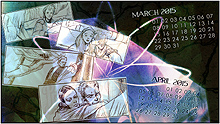



IMAGE |
WALLPAPER |
FAN ART |
FAN FICTION |
Rush by Love and Rock Music. (TCW) The first half of "Destroy Malevolence," as Anakin and Padmé make their way towards each other. |
P/A SITE
|
|
CALENDAR
|
 |

ESSAYS & DISCUSSION
-------------------------------------------
The Women in Anakin's Life
by lazypadawan
------------------------------
Anakin Skywalker's downfall was the result of his overpowering emotions and the determination to literally do anything in his power to save his beloved wife from dying. "I won't lose you the way I lost my mother," Darth Vader tells Padmé in Revenge of the Sith. Anakin has suffered losses in his life, but none haunt him more than losing his mother and his wife.
More than one observer has noticed a connection between Anakin's intense love for his mother and the intense love he has for Padmé. Several of them have labeled this connection as Oedipal, a Freudian term for the period in a young boy's life when he is unconsciously in love with his mother and desires that love exclusively. The term is drawn from Greek tragic hero Oedipus who usurps his father Laius's throne by killing him and then unwittingly marries his mother Jocasta1. Certainly one must wonder if it is coincidental that Shmi and Padmé both happen to be dark-haired and dark-eyed. But it is not to say Anakin was in love with his mother in the way he was in love with Padmé. More accurately, Anakin goes from cleaving to his mother to cleaving to Padmé.
Since there is no natural or step father in the Skywalker household, Anakin is the de facto "man of the house" at birth (slave owners notwithstanding). Anakin is blessed and cursed with a depth of feeling greater than that of most people and the only one to accept his affections as a child was his mother. Add to that the adversities of a slave's life bringing mother and son closer together as well as the possibility Shmi may have some Force sensitivity, and you have the makings of a very powerful bond. They were each other's world and it's in Shmi's presence that Anakin feels safe and loved. Conversely, Anakin's protective tendencies began as a child. He feels a natural obligation to protect his mother, an obligation that takes on different forms throughout his life. During the events of The Phantom Menace, Anakin's life changes forever when he is offered freedom and the Jedi path. At age 10, he is filled with curiosity and a desire for adventure yet he is not ready to leave his mother. He is still deeply attached to her. Shmi is prepared to sacrifice the relationship with her son in order to give him a better life. She must realize she may never see him again. But Anakin is too young to fully appreciate that sacrifice, nor did he know that he was entering a culture that forbade even familial ties outside of the Jedi Order. His first experience with this culture shock was when he was being questioned by the Jedi Council in The Phantom Menace. He doesn't understand why it is significant that he would miss his mother or fear for her. It is natural for him to cherish the intense bond between mother and son, or to want to protect his mother.
The Phantom Menace marks not only Anakin's separation from his mother, it also marks his first meeting with Padmé Naberrie, his future wife. Padmé enters his life just as he is being separated from Shmi. In fact, her presence is the catalyst that leads to the separation of mother and son. Padmé is the herald of Anakin's destiny, for better or worse. It is the mechanical problems on her ship that brings it to Tatooine. This allows Qui-Gon Jinn to encounter Anakin and discover that he's the Chosen One. Anakin races in the Boonta Eve competition to help Padmé and when he leaves Tatooine, she looks after him. It is not coincidental Padmé is older than Anakin, just old enough for her to be in the beginning of adolescence while he is still pre-pubescent. Moreover she is entrusted with ruling her planet. This greater responsibility makes her more mature than most girls her age. So she is not only a peer and a friend to Anakin, "(b)efore she becomes lover, she also acts as a surrogate mother for Anakin in the absence of Shmi2." She provides the maternal gesture of covering Anakin with a blanket when he's cold and listens sympathetically as he admits he misses his mother. He gives her a gift of love, the pure love of a young boy, in the form of the japor snippet. She will literally carry this amulet to her grave. Throughout The Phantom Menace, Padmé expresses caring for Anakin and concern for his well-being. She doesn't want him to race in the Boonta Eve and during the race, she looks on nervously. She takes the time to talk to him on the ship and even when she is constrained by her duties as Queen, she finds a few moments to tell Anakin she still cares about him. Her kindness is not forgotten after the events of The Phantom Menace.
Anakin's boyish love for Padmé only grows over the decade apart from her. Interestingly enough, Anakin's love for and devotion to his mother does not fade over the years either. He carries a powerful love for both women in his heart despite not having seen either one of them in years. But fate in Attack of the Clones will bring them both back into his life.
It is interesting to note that Anakin first mentions the nightmares about his mother as he and Obi-Wan are standing guard in Padmé's apartment. Already, Anakin's protectiveness toward his mother has been transferred to a protectivess toward Padmé. In The Phantom Menace, Anakin acquiesced to Padmé's greater age and experience. But as a young man, he is now in a position to be the man of Padmé's house as well, and he possesses the skills to keep her from harm. This is why he is insistent on taking a proactive role in finding Padmé's assassin. He wants to show her that he cares for her and is able to protect her.
As Anakin pursues Padmé romantically, his nightmares of his mother's pain and suffering vanish and are temporarily forgotten. They're of less concern to him as he and Padmé grow closer. Then there is the pivotal scene where Anakin expresses his feelings for Padmé. She makes it clear their relationship can go no further. Anakin separates from Padmé and not so coincidentally, he dreams of his mother that night. Moreover, the nightmare is so bad, he's motivated to go find Shmi. Without the possibility of Padmé's love, Anakin reverts to his "first" love, his mother. But once Anakin is troubled, Padmé steps into her role as surrogate mother again. She goes with Anakin to Tatooine, partially to keep him out of trouble with the Council, partially to provide him with comfort and support. For most of the time, Padmé looks on with concern instead of acting authoritatively as she tries to act earlier in the film. She gives Anakin an embrace before he goes in search of Shmi and when he returns, she comforts him in his darkest moments. She also absolves him of murdering the Sand People in retaliation for Shmi's death, telling him "to be angry is to be human." When Anakin won't act to rescue Obi-Wan, out of insecurities from a perceived failure to save his mother, Padmé stirs him to action, helping to bring Anakin back to his old self.
With Shmi gone and with Padmé accepting his love, Anakin's feelings for Padmé grow in intensity. She's the only woman in his life by the end of Attack of the Clones, the only mother figure remaining. With the galaxy at war and tensions with the Jedi Council, Anakin feels safe, loved, and secure with Padmé. Moreover, there are two aspects of their relationship that create a more intimate bond than what he had with Shmi. First there are shared secrets: their marriage and the Sand People incident. Second is the sexual nature of their relationship. Anakin is the sort who doesn't take his feelings for anyone lightly, so assuming Padmé is the only woman he's been intimate with, it stands to reason he'd consider their relationship closer than with any other. "She's a substitute mother, lover...all the things the Jedi Order won't let him have3."
Therefore, when Anakin is faced with the premonition of his wife's death, all of the emotional and psychological baggage he'd carried from his relationship with Shmi comes to the forefront. He'd sworn at his mother's grave not to fail again but this time the quest is to save his mother's emotional surrogate, Padmé. Unfortunately, it is Anakin's obsession with cheating death that leads to Padmé's own death.
The tragedy isn't just Padmé's death leading to decades of isolation for Vader. It's also that his commitment to evil all but destroys the relationship with the final woman in his life, Leia. Another man ends up raising his only daughter, and for the rest of Vader's life, his relationship with Leia is adversarial. Had Anakin remained in the light and raised Leia himself, they would have undoubtedly been very close. In fact, it's interesting that the very last thoughts of a redeemed Anakin are of her.
Footnotes:
1. "Oedipus complex," Wikipedia. <<back
to essays & discussion
2. Hanson, Michael J. & Kay, Max S. Star Wars: The New Myth. Xlibris. 2001, pg. 359.
3. Smith, Jim. Virgin Film: George Lucas. Virgin Books: London. 2003, pg. 253.
-